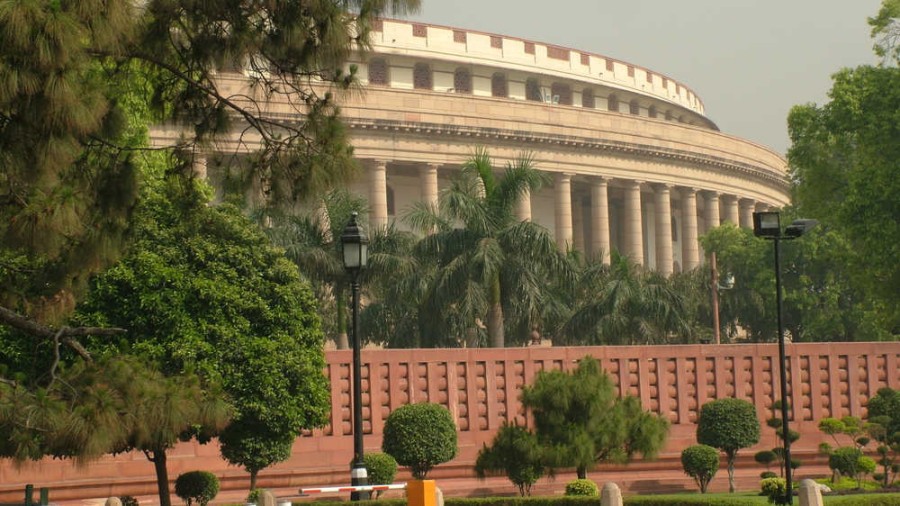
Murder of democracy, cries -Opposition Will answer every question asked in Parliament: Govt Not all parties consulted: Congress
 TT, Agencies | New Delhi | 03.09.20 : The Centre on Thursday said it would answer every question asked in Parliament, and 160 “unstarred” questions would be answered every day during the monsoon session starting September 14, sources said.
TT, Agencies | New Delhi | 03.09.20 : The Centre on Thursday said it would answer every question asked in Parliament, and 160 “unstarred” questions would be answered every day during the monsoon session starting September 14, sources said.The sources countered the Opposition charge that the Question Hour was being curtailed and pointed out that it has been dispensed with in previous years for various reasons.
Research conducted by the Rajya Sabha also revealed that 60 per cent of Question Hour time was not availed during the past five years.
Sources said the Question Hour was done away with during the Emergency in 1975 and 1976.
Unlike then, the country is now in the midst of a health emergency due to Covid-19 and the season is being held under extraordinary circumstances even as there is paucity of time, the government said.
The presiding officers of both the Lok Sabha and the Rajya Sabha have been informed by the ministry of parliamentary affairs that the government has consulted various political parties and that there is broad consensus, barring one political party, on doing away with the Question Hour.
It is based on this consensus among the Opposition parties that the government has requested the presiding officers to do away with the Question Hour and Private Members’ Business for this session, the sources said.
‘Assault on democracy’
The Congress’s chief spokesperson Randeep Surjewala alleged that parliamentary affairs minister Prahlad Joshi had not consulted all the Opposition leaders.
He said that doing away with the Question Hour and not holding the government accountable to the questions of public interest raised in Parliament in the “starred” category was “an assault on India’s democracy and a sinister design to undermine Parliament and parliamentary practices”.
He said that in the “starred” question category, the minister concerned has to answer supplemental questions. The idea is to hold the government accountable to ensure that public welfare steps are taken and fix accountability of the government to Parliament and through it to the 130 crore people of India, the Congress leader said.
Besides the “unstarred” questions, up to 10 special mentions will also be taken up to bring matters of importance to the government’s notice, the sources said.
Both Houses will also discuss important issues like the pandemic, the state of the economy and other developments and there will be provisions for short discussions, besides calling attention notices will also be taken up, the sources added.
‘Murder’ of democracy
The Opposition has criticised the government for its decision to not have the Question Hour and the Private Members' Business, alleging that it is trying to “murder” democracy in the name of Covid-19, and the session is being convened to bring legislative proposals to replace ordinances.
“By abolishing the Question Hour, the government is running scared of answering relevant questions to the people of India through their elected representatives. The Modi government does not want to answer questions on the transgressions by China, about India’s economy and the free fall of the GDP.
“The Modi government does not want to be held accountable in the coronavirus pandemic. It does not want to be held accountable for the closure of businesses and industries. The Modi government does not want to be held accountable for the sinister stifling of democracy and that is why it wants to end the Question Hour. The Congress party will oppose it tooth and nail,” Surjewala said at an online media briefing.
Government sources have argued that there has been no Question Hour in state Assemblies ruled by the Congress and other Opposition parties during the pandemic and that sessions are being held for only one to three days.
Only 40% time utilised
The research conducted by the Rajya Sabha Secretariat revealed that during 2015-19, only about 40 per cent of the Question Hour time was available to raise questions and obtain oral responses of the government and the rest went unused on account of disruptions.
During 2015-19, the Rajya Sabha held a total of 332 sittings, during which a total time of 332 hours was available for the Question Hour, but only 133 hours and 17 minutes were spent on raising questions and obtaining oral replies from the ministers concerned.

0 Response to "Murder of democracy, cries -Opposition Will answer every question asked in Parliament: Govt Not all parties consulted: Congress"
Post a Comment
Disclaimer Note:
The views expressed in the articles published here are solely those of the author and do not necessarily reflect the official policy, position, or perspective of Kalimpong News or KalimNews. Kalimpong News and KalimNews disclaim all liability for the published or posted articles, news, and information and assume no responsibility for the accuracy or validity of the content.
Kalimpong News is a non-profit online news platform managed by KalimNews and operated under the Kalimpong Press Club.
Comment Policy:
We encourage respectful and constructive discussions. Please ensure decency while commenting and register with your email ID to participate.
Note: only a member of this blog may post a comment.